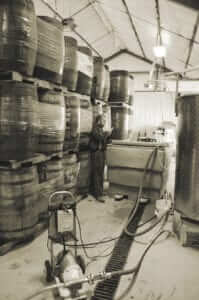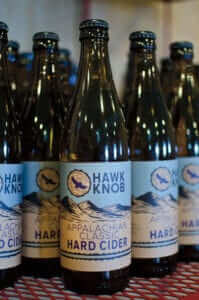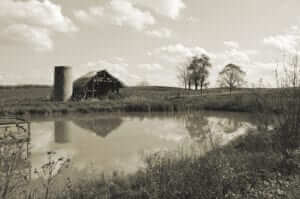Starting the first commercial cidery in the state in living memory isn’t enough. The guys at Hawk Knob Hard Cider and Mead can’t help thinking up even more ways to press West Virginia’s apple harvest into our drinking glasses.
Huge wooden field bins filled with apples of all colors and sizes. Long, high shelves of oak barrels lying on their sides. It’s a pioneering effort by two guys who look the part. But Will Lewis, often found in suspenders or overalls, and Josh Bennett, a natural wearer of Western hats, come by their rustic appearance honestly. They’re not actually trying to look like trailblazers; they’re too busy resurrecting an old-time West Virginia industry: hard cider.
Bennett and Lewis became friends when they studied horticulture at West Virginia University a decade ago. They brewed cider and mead together in small batches in college, and they shared a fascination with apple culture. “The fact is, hard cider was the quintessential American beverage at one time and has deep, deep roots in Appalachia. This is our cultural heritage,” Bennett says. “We should be embracing it and bringing it back.”

Getting started wasn’t easy. Once Bennett jumped through the hoops required by the federal “alternating proprietorship” license—authorization for Hawk Knob to rent the equipment of the still-operating Watts Roost winery outside Lewisburg—he was surprised to find that the state licensing process was even harder. “They said, ‘Alternating proprietorship? We never heard of it and it’s not allowed in West Virginia.’” He read all of the legislation and code that govern the state Alcohol Beverage Control Administration and found nothing prohibiting alternating proprietorship. It finally took the support of three state senators to get the operation issued a state farm winery license. Now they are the only “winery” occupying the former Watts Roost—West Virginia’s first modern cidery.
Resurrecting
Hard cider has had a chicken-and-egg problem in the U.S. Orchards stopped growing the tart and bitter apples that give cider depth back when Prohibition killed the market in the 1920s. And today’s orchards haven’t wanted to plant them anew without a market in place—which has struggled without the apple varieties that make a flavorful product.
Thanks are due to the pioneers who put out those one-dimensionally sweet hard ciders of the ’80s and ’90s. They prepared the ground, and cider has recently started to come back in all its lush, pre-Prohibition variety.
Bennett and Lewis had some luck from the beginning. Morgan Orchard in neighboring Monroe County grows some bittersweets and bittersharps traditionally used in farmhouse ciders, like Staymans and Yorks, and other cultivars like Sheepnose and Winter Banana that add satisfying aromatics. Mixing the standard and heirloom varieties they had access to, the new cidermakers created a signature blend that harmonizes all four categories of taste perception, Bennett says: sweet, tart, bitter, and aromatic. Apples that taste astringent or bitter have compounds that let a cider age longer, too, he says, giving a fuller flavor profile. “Like most wines in the world, the best ones out there are blends.”
It takes a lot of apples to make cider. In 2015 Hawk Knob pressed 75 bins of apples to make 4,000 gallons of cider—that’s 30 tons, 60,000 pounds of apples. They doubled that in 2016 to 150 bins. They used some of that 2016 juice to make their first cider alternative—cyser, an apple–honey wine made with honey from Lewis’s own bees—and the rest made about 6,000 gallons of cider.
The 2018 season is Hawk Knob’s fifth. Any apples Lewis and Bennett don’t press soon after the August-through-October harvest will have to be kept in cold storage or pressed for juice that will be frozen. Freezing
Bennett and Lewis will press more apples than ever this year to satisfy enthusiastic fans. But the operation’s steady growth is starting to outstrip its equipment. “The press holds 60 gallons of pulp at a time—it took us two and a half months to press 7,500 gallons,” Bennett says. “There are operations that press that in a couple days, and more efficiently—the same amount of apples would produce nearly 9,000 gallons.”
Cultivating
Bennett and Lewis aren’t just brewers and businessmen; they’re horticulturists. As Hawk Knob’s output grows, they’ve been working behind the scenes to transform the input side—trees.
On 50 acres they own in Pocahontas County, they graft a couple hundred trees every spring. They’re focusing on rarer varieties, Bennett says, to make those complex flavors available for their blend.
Cultivars they’ve grafted include some American cider varieties like Virginia Crab, Harrison, Albemarle, Roxbury and Golden Russet, and the famous West Virginia variety Grimes Golden, Lewis says. They’ve also grafted English-style apples such as Dabinett, Yarlington Mill, Kingston Black, and Harry Masters Jersey. These are just charming names for those of us who don’t know the industry, but they’re the difference between a bland cider and a unique one. “A lot of them have a higher astringent or bitter aspect that’s hard to find around here,” Lewis says.
All of this takes a long view on the business. So far, they’re testing most of their grafts in nursery beds. Once they start planting into the orchard proper—this fall, possibly, or next spring—it’ll be four to seven years or even longer before they can harvest, depending on the cultivar and the management practices they apply. Those apples’ more complex flavors will gradually enter the blend.
They’re also encouraging other orchardists to plant cider cultivars. “These varieties are just going to become more and more valuable as the cider industry grows,” Lewis told WV Living in 2016. “Farmers will get more per bushel, because the cideries will have the ability to pay more than for culinary apples. This is just the beginning of it in West Virginia.” That future already seems to be coming true with the market launch in 2017 of Swilled Dog Hard Cider, based in Franklin, West Virginia—the state’s second commercial cidery.
Marketing
Hawk Knob hard ciders are distributed by Country Vintner of West Virginia to bars, restaurants, and wine retail outlets almost everywhere in the state.
In service to expanding their market, Bennett shopped the ciders around Washington, D.C. in June 2017. “I had
A partnership with a future
Like a well-blended cider, Lewis and Bennett form a partnership of complementary qualities. Asked what Lewis brings to the table that he doesn’t, Bennett, the talker, doesn’t hesitate: “patience.” What in Bennett balances that patience out? “Josh has an outstanding drive to get things done right now,” Lewis says, adding, “He also has a lot of experience with equipment and hauling that I haven’t had. I learn that from him.”
Over time, they’ve both learned to do it all, Bennett says. “And because of that, we can divide and conquer, or quite easily come into a situation with double strength and knock it out.”
In 2017, their third summer, the two set up a tasting room at their facility on Blue Sulphur Pike west of Lewisburg. “We’ve brought in a selection of imported cheeses and charcuterie to pair with our ciders, and we’re having live music events, too,” Bennett says. “We’re also starting to do dinner pairings, bringing caterers in that feature their foods paired with our ciders.”
In June, they released Hawk Knob’s first cyser. “It’s aged over two and a half years now, which is pretty rare to find on the mead market,” Lewis says. “It’s dry like our ciders and well-balanced. I think a lot of people are really excited that’s out there.”
Also in June, Bennett went to Normandy, in France, to study with Christian Drouin, one of the most celebrated makers of Calvados—the local apple brandy. It’s part of Hawk Knob’s big vision of West Virginia’s apple future. “We’re in one of the best apple-growing regions in the country, next to the Northwest,” he says proudly. “We feel this region is set up to become an apple-growing region again. And I feel that American brandy is going to be the next thing out.”
Photographed by Nikki Bowman











Leave a Reply